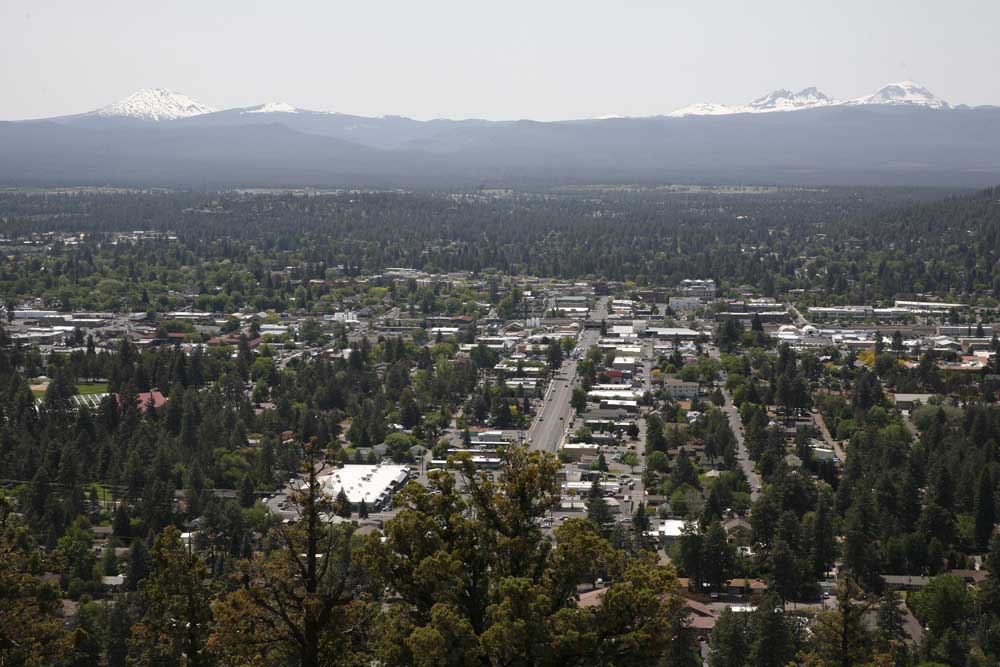Bend ranked No. 4 for best places to work remotely in U.S.
Published 3:00 pm Monday, March 11, 2024

- A view of Bend looking west from Pilot Butte in 2018.
Bend is the fourth most suitable location for remote workers in America, according data analysis by DesignRush, a brand marketing company.
Only Boulder, Colorado; Raleigh-Cary, North Carolina; and Austin, Texas are more favorable for remote workers, according to the survey taken from U.S. Census Bureau and Federal Communications Commission broadband data. Corvallis and Portland were also on the list, coming in at No. 6 and No. 8.
Using data from these two sources, the marketing company ranked metro areas by suitability for remote working. Analysts reviewed housing costs, percentage of remote workers, broadband connections and commute times to come up with the ratings. Bend scored 70.9 out of 100. Boulder, the No. 1 rated metro area, scored 77.5 out of a 100, according to the analysis.
It’s been said that many new residents have sought haven in Bend because of a work-balance reputation. In 2021, the year data are most current, 22.7% of the workforce in Oregon worked remotely. In 2012, by comparison, only 6.2% of the workforce worked remotely in Oregon.
“I think we have learned in our post COVID lockdown world, remote work can be an attractive option for some businesses and workers,” said Eric Sande, Redmond Chamber of Commerce executive director. “Central Oregon is a quality of choice and has always been a great place to live, work and play.”
Having a remote workforce saves employers money by requiring smaller office space and enables them to have broader reach when recruiting employees. For employees, they don’t have to commute, and they can live anywhere, Sande said.
Growth in co-working
In NorthWest Crossing, Work-Collective co-working space co-founder Sara Odendahl said she’s seen a month-over month increase in membership and drop-in business during the summer and holiday seasons. With 11,000 square feet, the Work-Collective has dedicated space for remote workers coming regularly and those needing space for an hour or two.
“Bend is known for its startup mentality,” said Odendahl, who founded the coworking space in 2020. “With the folks coming here to work remotely or for transition space, it’s neat that Bend can offer the environment to support these companies.”
Since the pandemic, the concept of where people work has really expanded, she said. Even now as companies shift back to a physical workplace, employees living in Bend working for large companies are seeking dedicated coworking spaces so they don’t have to return to corporate headquarters, Odendahl said.
There is a savings on having no office or a smaller one for businesses, and workers save time and expenses avoiding commuting to and from work every day.
Analysis by the numbers
According to the DesignRush analysis, Bend received high high marks for a large pool of remote workers, about 15%, and relatively inexpensive monthly access to fiber optic broadband. Bend, however, lost points for its high housing costs. The analysis found that housing was 18% higher than the national average, coming in at $1,419 a month.
The influx of lifestyle-seeking remote workers has contributed to increased housing costs, making it a challenge for many residents to find a home at a reasonable rate, said Katy Brooks, Bend Chamber of Commerce CEO.
“Bend is certainly an attractive place for those who can work remotely,” Brooks said. “The idea of blending skiing, hiking, or biking during a workday is highly attractive.”
Remote workers can face challenges integrating into the community unless they make a concerted effort to get involved in local activities and schools, Brook said.
Corvallis scored 70.5 out of 100 in the DesignRush survey. Its score was boosted by 13.3% remote workforce, and low cost broadband. Housing costs, however, were in range with the national average of about $1,206 per month.
In Portland, the analysis scored lower at 69.9 out of 100. The area’s remote workforce totaled about 14.4%. Its housing costs were 26% above the national average at $1,513 per month.
Fairbanks, Alaska was the worst place among cities suitable for remote work with a score of 39.3.






